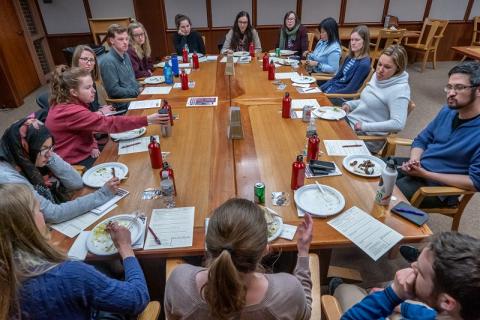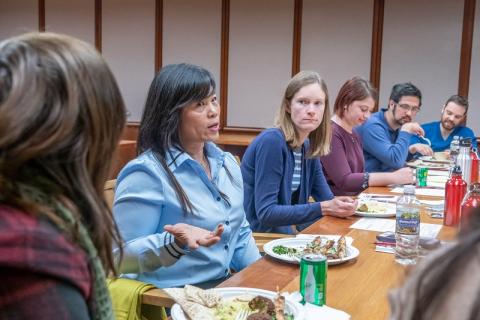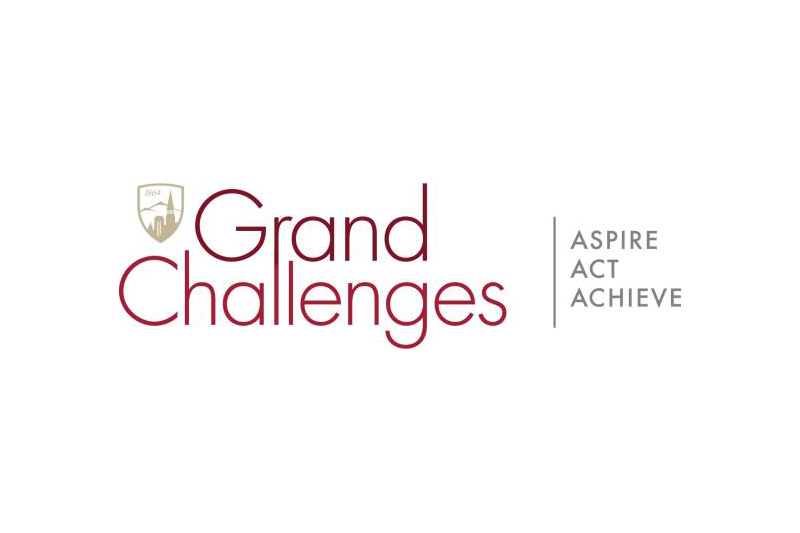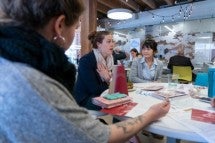Hundreds Share Ideas at ‘A Community Table’
104 tables span the globe in DU’s second such event
One day, Oliver Martinez-Reyes sees himself making a difference as a CEO, leading meetings in a boardroom. On April 10, the second-year student at the Daniels College of Business got some practice, bringing his peers around a table at the college’s Schneider Board Room and brainstorming ways to improve their world at A Community Table.
“I think the ideas we generate in this conversation will be like none other,” Martinez-Reyes said. “We all come from different backgrounds, we all have different stories, and I’m just really excited that they’ll be connecting with others with similar interests or ideas or even ideas they haven't been exposed to.”
For the second consecutive year, the University of Denver and its Center for Community Engagement to advance Scholarship and Learning (CCESL) spread that conversational spirit across the globe. In 104 locations across eight states over the course of the day, groups of 8–12 met over a meal and brainstormed ways to increase economic opportunity in their communities. Local businesses Café 180, Comal, Maddie’s Restaurant, Osage Café and Sun Valley Kitchen partnered with CCESL to provide snack boxes to participants.
Their meetings could be anywhere—a coffee shop, a restaurant, a spot on campus—and could include anybody. The only requirement was an interest in tackling their community’s grand challenges, including expanding access to education, improving infrastructure, fulfilling employment rights and decreasing poverty.
"A Community Table is important for so many reasons," said Katie Kleinhesselink, the DU Grand Challenges program manager. "It provides a space for folks to get together, share food and have an intentional conversation about the things that matter to them. I know that I walked away from the conversations I had feeling really connected, energized, and optimistic. These sorts of experiences matter more than ever in the polarized climate we’re navigating today."
Denver City Councilman Paul Kashmann hosted a table at Maddie’s Restaurant, just west of campus. He compared the setting to a Thanksgiving dinner, with folks sitting around and talking about the subject of the day.
“The more voices we get to participate, the more ideas are going to come forward and the more of a buy-in people are going to have to the solutions we come up with,” he said. “We hear from experts all the time, but it's the everyday citizen that I think really comes up with the solutions.”
Meanwhile, inside a Sturm Hall classroom, students, staff and alumni from the College of Arts, Humanities and Social Sciences munched on falafel from Jerusalem Café. Their discussion spanned such topics as air quality, debt from student loans and high tuition costs.
“I think it’s important to have opportunities like these,” said Nicholas Bass, a third-year student. “I don't think the point of college is to have your beliefs affirmed. I think it’s to have them challenged.”
His friend, third-year student Sydney Plaskett, agreed: “Going to an event knowing your ideas and opinions will be heard is one of the best outcomes of these tables.”
The ideas generated at last year’s event are already on the path to action. Following those discussions, CCESL created four Collective Impact Cohorts. Composed of members of the University and Denver communities, these groups work across disciplines in the areas defined at last year’s tables. With up to $100,000 in support from DU IMPACT 2025, the cohorts will spend two years creating measurable change.
But it all starts at the table, said Bridget Abraham, who works at Western Union. “What we’ve learned in the business community is a diverse conversation often leads to the best ideas,” she said. “I think universities have a unique opportunity where they have a lot of students and a real footprint in the community and a real vested interest in growing those students and bringing forth ideas.”
For a student like Martinez-Reyes, who as a Puksta Scholar was already committed to engaging the community on social issues, A Community Table is the perfect forum to form the connections that support a stronger future.
“This format of actually bringing people together to have that conversation mitigates a lot of things and actually creates that innovation and creativity I see when people start engaging in dialogue,” he said. “The energy is indescribable.”












